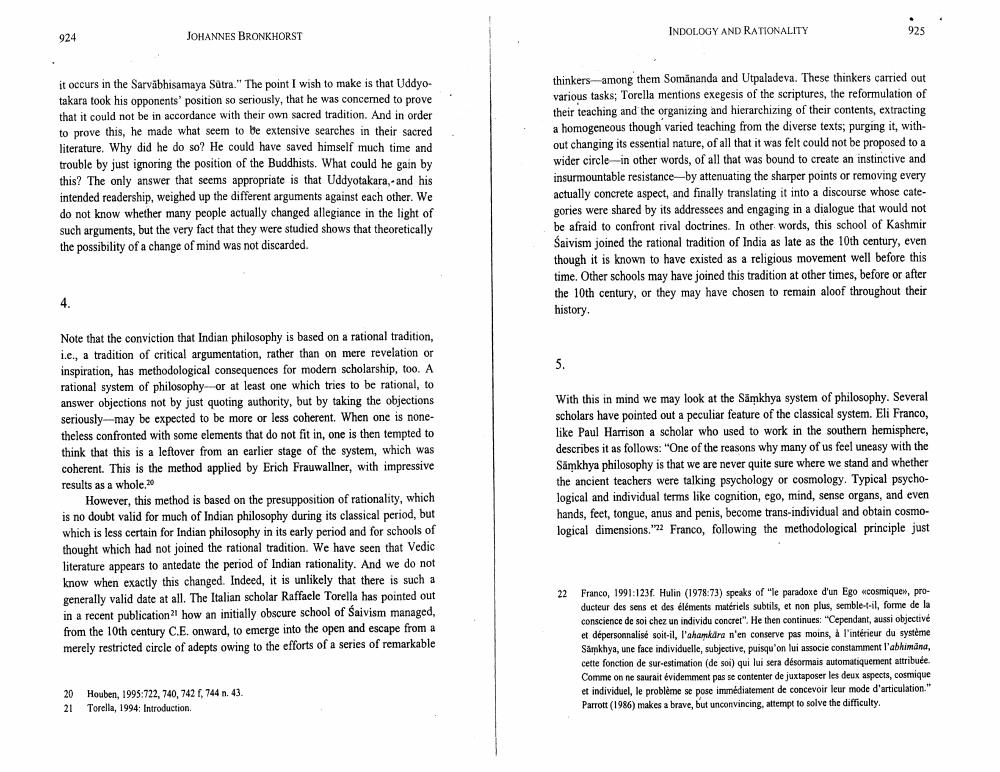Book Title: Indology And Rationality Author(s): Johannes Bronkhorst Publisher: Johannes Bronkhorst View full book textPage 5
________________ 924 JOHANNES BRONKHORST it occurs in the Sarvabhisamaya Sutra." The point I wish to make is that Uddyotakara took his opponents' position so seriously, that he was concerned to prove that it could not be in accordance with their own sacred tradition. And in order to prove this, he made what seem to be extensive searches in their sacred literature. Why did he do so? He could have saved himself much time and trouble by just ignoring the position of the Buddhists. What could he gain by this? The only answer that seems appropriate is that Uddyotakara,- and his intended readership, weighed up the different arguments against each other. We do not know whether many people actually changed allegiance in the light of such arguments, but the very fact that they were studied shows that theoretically the possibility of a change of mind was not discarded. 4. Note that the conviction that Indian philosophy is based on a rational tradition, i.e., a tradition of critical argumentation, rather than on mere revelation or inspiration, has methodological consequences for modern scholarship, too. A rational system of philosophy-or at least one which tries to be rational, to answer objections not by just quoting authority, but by taking the objections seriously may be expected to be more or less coherent. When one is nonetheless confronted with some elements that do not fit in, one is then tempted to think that this is a leftover from an earlier stage of the system, which was coherent. This is the method applied by Erich Frauwallner, with impressive results as a whole,20 However, this method is based on the presupposition of rationality, which is no doubt valid for much of Indian philosophy during its classical period, but which is less certain for Indian philosophy in its early period and for schools of thought which had not joined the rational tradition. We have seen that Vedic literature appears to antedate the period of Indian rationality. And we do not know when exactly this changed. Indeed, it is unlikely that there is such a generally valid date at all. The Italian scholar Raffaele Torella has pointed out in a recent publication21 how an initially obscure school of Śaivism managed, from the 10th century C.E. onward, to emerge into the open and escape from a merely restricted circle of adepts owing to the efforts of a series of remarkable 20 Houben, 1995:722, 740, 742 1, 744 n. 43. 21 Torella, 1994: Introduction. 5. INDOLOGY AND RATIONALITY thinkers among them Somānanda and Utpaladeva. These thinkers carried out various tasks; Torella mentions exegesis of the scriptures, the reformulation of their teaching and the organizing and hierarchizing of their contents, extracting a homogeneous though varied teaching from the diverse texts; purging it, without changing its essential nature, of all that it was felt could not be proposed to a wider circle in other words, of all that was bound to create an instinctive and insurmountable resistance-by attenuating the sharper points or removing every actually concrete aspect, and finally translating it into a discourse whose categories were shared by its addressees and engaging in a dialogue that would not be afraid to confront rival doctrines. In other words, this school of Kashmir Śaivism joined the rational tradition of India as late as the 10th century, even though it is known to have existed as a religious movement well before this time. Other schools may have joined this tradition at other times, before or after the 10th century, or they may have chosen to remain aloof throughout their history. 925 22 With this in mind we may look at the Sämkhya system of philosophy. Several scholars have pointed out a peculiar feature of the classical system. Eli Franco, like Paul Harrison a scholar who used to work in the southern hemisphere, describes it as follows: "One of the reasons why many of us feel uneasy with the Samkhya philosophy is that we are never quite sure where we stand and whether the ancient teachers were talking psychology or cosmology. Typical psychological and individual terms like cognition, ego, mind, sense organs, and even hands, feet, tongue, anus and penis, become trans-individual and obtain cosmological dimensions."22 Franco, following the methodological principle just Franco, 1991:123f. Hulin (1978:73) speaks of "le paradoxe d'un Ego «cosmique»>, producteur des sens et des éléments matériels subtils, et non plus, semble-t-il, forme de la conscience de soi chez un individu concret". He then continues: "Cependant, aussi objectivé et dépersonnalisé soit-il, l'ahamkära n'en conserve pas moins, à l'intérieur du système Samkhya, une face individuelle, subjective, puisqu'on lui associe constamment l'abhimana, cette fonction de sur-estimation (de soi) qui lui sera désormais automatiquement attribuée. Comme on ne saurait évidemment pas se contenter de juxtaposer les deux aspects, cosmique et individuel, le problème se pose immédiatement de concevoir leur mode d'articulation." Parrott (1986) makes a brave, but unconvincing, attempt to solve the difficulty.Page Navigation
1 ... 3 4 5 6 7 8 9 10 11 12 13
